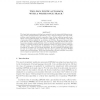Free Online Productivity Tools
i2Speak
i2Symbol
i2OCR
iTex2Img
iWeb2Print
iWeb2Shot
i2Type
iPdf2Split
iPdf2Merge
i2Bopomofo
i2Arabic
i2Style
i2Image
i2PDF
iLatex2Rtf
Sci2ools
JALC
2007
2007
Two-Way Finite Automata with a Write-Once Track
The basic finite automata model has been extended over the years with different acceptance modes (nondeterminism, alternation), new or improved devices (two-way heads, pebbles, nested pebbles) and with cooperation. None of these additions permits recognition of non-regular languages. The purpose of this work is to investigate a new kind of automata which is inspired by an extension of 2DPDAs. Mogensen enhanced these with what he called a WORM (write once, read many) track and showed that Cook’s linear-time simulation result still holds. Here we trade the pushdown store for nondeterminism or a pebble and show that the languages of these new types of finite automata are still regular. The conjunction of alternation, or of nondeterminism and a pebble permits the recognition of non-regular languages. We give examples of languages that are easy to recognize and of operations that are easy to perform using these WORM tracks under nondeterminism. While somewhat similar to Hennie machine...
| Added | 15 Dec 2010 |
| Updated | 15 Dec 2010 |
| Type | Journal |
| Year | 2007 |
| Where | JALC |
| Authors | Berke Durak |
Comments (0)

